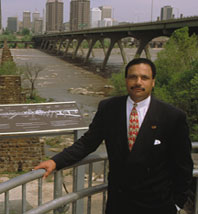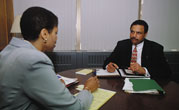CEO of Virginia's Capital Cityby Su Clauson-Wicker
"We're the gateway to the rest of Virginia," Jamison says, as he picks a piece of litter from the sidewalk near the historic canal walkway not far from Richmond's downtown skyscraper district. "When people look at moving to a locality, they ask three basic questions: Is it clean? Is it safe? How are the schools? Cleanliness and aesthetics are important in our living-room concept." Although Jamison cuts a striking example in his three-piece suit as he stoops to pick up a candy wrapper, he makes it clear that the cleanliness of the city is not totally the responsibility of those who draw their paychecks from city hall. "If each of Richmond's 200,000 citizens picked up a piece of litter, think how clean the city would be," he says. "I'm trying to create a climate of citizen responsibilitya climate where people feel they are in partnership with their government." Jamisom likes to think of his job as CEO of an $800-million corporation called the City of Richmond. He talks about citizen responsibility, but he also expects the 4,800 city employees to treat residents like customers who can take their business elsewhere. Since Jamison left his position as director of worldwide human resources for Ethyl Corporation to take the city office two years ago, he has been drumming the business ethos into municipal consciousness. "We're working on a strong customer service orientation," he says. Our product is service. Just as important as what we provide is how we provide it. Can we make our permitting process easier? Can we improve the way citizens pay taxes? We want to allow citizens to pay bills, sign up for courses, and access city information electronically. We need to be asking ourselves: 'If we were a business, would we still be in business?'" As soon as you enter city hall, you see a banner proclaiming Richmond's commitment to customer service, "Richmond Cares: Our Business is Serving You." Employees also receive a newsletter with articles on aspects of customer service and a profile of the Richmond Customer Service Employee of the Month. The city trained employees in enhanced customer service, and the results are evident in the way visitors receive prompt, courteous attention. "We invested in our people. Now I'm asking them to make the extra effort," Jamison says.
Public safety is just one of the areas that Jamison and city council set as priorities to enhance Richmond's attractiveness and reduce the poverty that straps 20 percent of its citizenspublic education, success for the city's youth, neighborhood revitalization, and transportation are also prime issues. More than a quarter of Richmond's budget is directed toward education, and the city parks and recreation department runs a very aggressive after-school program. Six areas, including some of Southside Richmond, have been targeted for revitalization efforts in an energetic "Neighborhoods in Bloom" initiative. Richmond is also renovating its main train station for high-speed rail service from Washington, D.C. From the top of city hall, Jamison can point out the changes occurring in Richmond, as well as the spots earmarked for change. The nearby Virginia Biotechology Park is expected to generate 3,000 new jobs; the rebuilding of the Kanawha and Haxall canals and an accompanying walking path should be completed this summer; and a Greater Richmond Convention Center will triple the space for large gatherings, making it the largest such facility in the state. Commitments are being made to revitalize Broad Street and historic Jackson Ward. Jamison, who chairs the Virginia Tourism Board, is especially enthusiastic about creating a series of districts in the citya theatre district, an entertainment district, and a museum district. He was very involved in devising a new city logo, one showing the city skyline rising from the edge of a river. "We wanted something that would show a new, vibrant city," says Jamison. "We've retired George Washington to 'logo emeritus' status." Richmond accepts its rich historical past, he says, but it was time to update the city's image to reflect its business, diversity, and cultural environment, as well as the beauty of the James River. "I have a vision to make Richmond the 'City of Choice' in a destination state," Jamison says. Being the CEO of the City of Richmond requires you to be a public figure, a spokesperson, a leader. You have to get out in the community. It's a 24-hour-a-day, seven-day-a-week job." Richmond has been blossoming in recent years. Twelve Fortune 1,000 companies are headquartered here. Entrepreneur magazine ranked Richmond the "No. 1 Mid-sized City in the United States for Small Business." Money recently called Richmond the "Best Place to Live in the South" among medium sized cities. "Local government is where it all happens," says Jamison. "You can really make a difference at this level." Making a difference is important to Jamison. Even as a Virginia Tech student, he felt he didn't have much right to complain about a situation, unless he planned to do something about it. As president of the Human Relations Council, he worked to increase minority enrollment and support systems for minority students at Tech. Admission officials came to him with a job offer, and he worked in general admissions and minority recruitment, later becoming assistant to the president at Tech. Jamison, a Martinsville, Va., native, might have stayed in academia if not for his wife, Birdie, who left the Roanoke Commonwealth Attorney's Office and Tech business faculty for a position as assistant attorney general and persuaded her husband to make the move to Richmond. She is a general district court judge with an office across the street from city hall. At least one of their three children, aged 6-18, has been attending Richmond public schools since 1989. "My family has had to make sacrifices for me to accept the demands of this job," he says. "They've been a great support system." Jamison has been involved in a number of civic and community activities. He is past chairman of the State Advisory Board to the Virginia Employment Commission, past president of the Arts Council, and a former member of the Governor's Five-Star Workforce Development Task Force. He's also involved in starting a black alumni association chapter at Tech. From the time he gets on his Stairmaster at 5:30 a.m. until he returns home at 9 p.m. from city council or another meeting, Jamison moves at a steady speed–charging. "How do I do it? High energy and a commitment to make a difference. I just keep going," he says. |
 Calvin Jamison (physical education '77, M.A., Ed.D.) thinks of Virginia's capital city as the living room of the state, and he, as Richmond's city manager, is the host.
Calvin Jamison (physical education '77, M.A., Ed.D.) thinks of Virginia's capital city as the living room of the state, and he, as Richmond's city manager, is the host. One of Jamison's first moves was to get city employees a raise. In an effort to tie bonuses to achievement of the major strategic goals set by city council, Richmond also gave its workers a small reward last year when violent crime dropped by 30 percent.
One of Jamison's first moves was to get city employees a raise. In an effort to tie bonuses to achievement of the major strategic goals set by city council, Richmond also gave its workers a small reward last year when violent crime dropped by 30 percent.